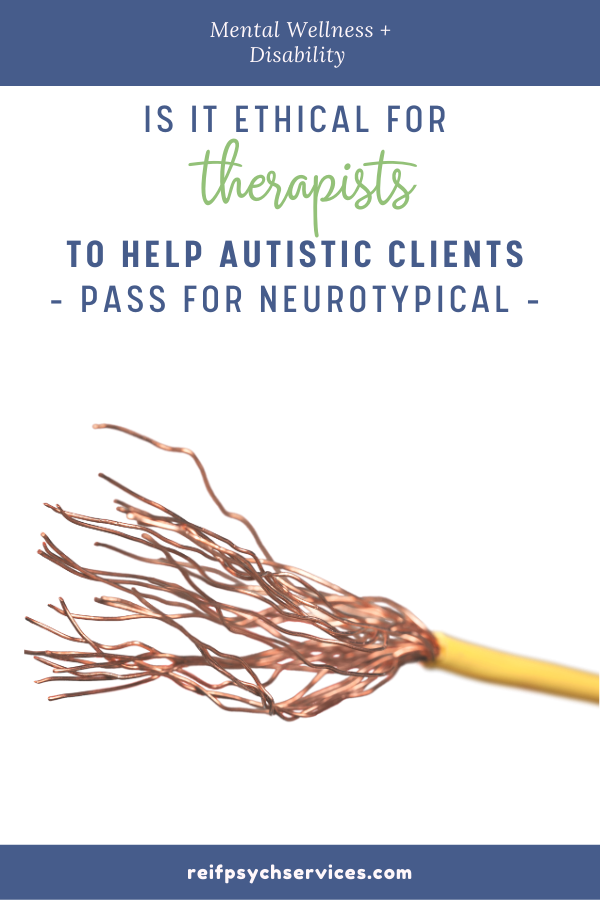A few weeks ago, I got an email from an old friend I knew from graduate school. The email read:
“I have a possible referral for you, wanted to make sure it’s a good fit before I send this person your way. Potential client is a young adult with autism. They are hoping that counseling can help them pass for neurotypical at work and in social settings. Tell me if you can help!”
Could I help this client?
Possibly. I certainly wanted to.
Could I help this client in the way they were asking for help?
Maybe I could. But I wondered if I should.

What is Autistic passing?
‘Passing’ as neurotypical goes by many names, including
- Masking
- Camouflaging
- Compensating
Each of these terms has some nuance associated. To keep this post streamlined, I’ll use ‘passing’ as a catch-all phrase.
What might helping Autistic clients pass for neurotypical look like?
There’s no agreed upon definition for passing. I assumed that this client might want help with one or a few of the following common passing activities.
- Sustaining eye contact even if it hurts
- Maintaining ‘quiet hands’, even though for many Autistics ‘flappy hands are happy hands’
- Forcing facial expressions that ‘match’ emotions, no matter how contorted it feels
- Tolerating sensory discomfort to make everyone else feel comfortable, even though its painful
Passing has benefits.
Autistics choose to pass for many reasons, including:
- minimizing social anxiety
- developing friendships and romantic relationships
- feeling valued at work
They do it to make it through Thanksgiving dinner and important work meetings without being thought of as weird by others around the table.
That so many Autistics make deliberate choices to pass calls into doubt one of the characteristics that has been understood as a hallmark of Autism. Namely, the notion that Autistic people do not seek or value social contact. This article goes into more detail.
But at what cost do Autistics experience those benefits?
Many Autistics choose to pass every day in certain situations. Some might argue that this is no different than a neurotypical person who chooses not to use certain language in certain places.
But research tells us that there is a difference, and that the consequences of passing can be significant.
Me watching my mouth around my elderly family members does not cause me pain, or challenge my identity or my role in society. It does not put me at risk for developing mental health conditions.
Intentional efforts to pass for neurotypical can, over time, lead to all of these consequences.
In the moment, passing behaviors can cause extreme physical discomfort. I describe this in more detail in this post, in which I discuss why I won’t demand eye contact from Autistic clients.
Researchers describe passing as akin to physical exercise or mental mathematics computation. The energy output required to do it is real. The resulting fatigue may reduce the energy that Autistis have available for other pursuits. This might cause the impression that they aren’t interested in certain tasks or experiences. The truth may simply be that they are too tired to further exert themselves.
Another sticky aspect to passing is the role that it may play in preventing Autistics from receiving supports, including a diagnosis. I’ve supported many clients who sought an Autism diagnosis as an adult. Some were told that they compensated too well to meet criteria for ASD.
Most important, though, is the serious impact that ongoing passing can have for Autistics’ mental health. Articles like this one and this one, and this one, and this one describe the negative effects that passing can have. Passing is linked to significant declines in self-esteem, and on self-concept as an Autistic person. Passing is also linked to increased anxiety and depression in Autistics. Critically, passing has also been correlated with increased suicidality in Autistic adults.
With these considerations in mind, I wondered. Is it ethical for counselors to help Autistic clients pass for neurotypical?
Sometimes, when I am posed with an ethical quandary, I try to consider what would be right in similar circumstances.
What if my client didn’t have Autism, but instead had Anorexia? Suppose the client came to me asking for tips on how to eat less, because in their world view, they needed to weigh less. I have the skills to help clients learn to manage their eating habits. But is it appropriate to encourage this client in their desire to eat less?
Of course not.
It’s easy to see in this example that, just because you could, doesn’t mean that you should.
But the fact remains that this is an imperfect analogy. Anorexia represents behavior caused by an inaccurate self-concept. Autistic behavior is the result of neurodiversity. Unlike a person’s self-concept, no amount of therapy can change that core difference in an Autistic person’s neurological profile. I would argue that none should attempt to try.
And that’s what’s really on debate at the root of this client’s request. If a client is able to articulate their desire for change, even if that change that may put them at risk for other challenges, is it ethical for a counselor to refuse to take part in helping the client make that change?
Who can determine what’s truly in the client’s best interest?
Ultimately, I recognized, that the client had to be the one to make this decision. But first, I wanted to be sure they had all the facts.
Although I am a counselor who offers mental health therapy for Autistic adults, I knew that I personally wouldn’t be this client’s therapist if they wanted to proceed with behavioral modifications in order to pass for neurotypical. If you want to read more about my resistance to behavior compliance oriented interventions, I welcome you to read this post.
But I hoped that I could help by offering the potential client the chance to consider alternative therapeutic goals, given the known risks associated with passing.
So, I spoke with them, and listened as the person explained what changes they were hoping to make. They checked off all four of the passing examples I listed earlier, plus a few additional ones.
I shared my perspective and my concerns. I asked with genuine curiosity whether this person was open to other ways that they might achieve their goals without focusing on passing for neurotypical. They listened as I shared how I have helped other clients to feel less social anxiety and to develop meaningful relationships without changing their Autistic behavior.
They said they weren’t sure if that was what they really wanted.
I encouraged them to think about it, and to call other clinicians to gain additional perspective. I’d be here, I let them know, if they wanted to schedule a session.
I haven’t heard from them since.
Keep reading
Other posts you may be interested in
How to Know if Someone is a Real Friend. A Quiz for Teens and Adults with IDD.
In my counseling practice, I offer mental health counseling for teens and adults with IDD. Many of my clients who have Down syndrome, Cerebral palsy, and other disabilities have lots of meaningful friendships in their lives. But sometimes, they ask “how can I know if someone is a real friend?” Maybe you have a friend […]











